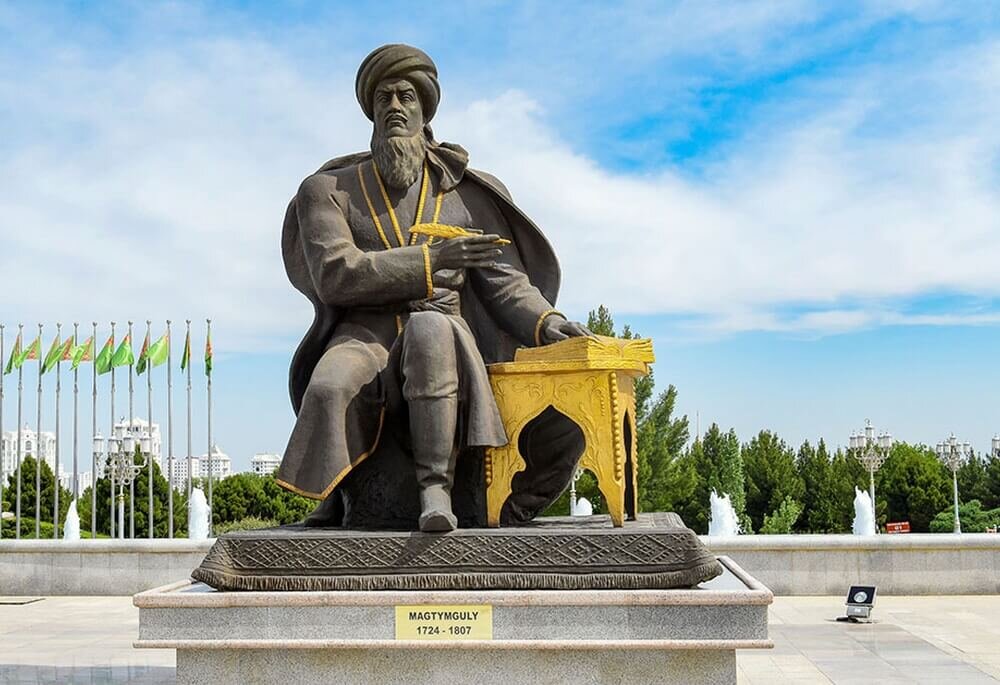Cultural commonalities between Iran, Turkmenistan helping improve friendship

TEHRAN-The International Conference of Ministers of Culture dedicated to the 300th birth anniversary of the Iranian-Turkmen poet Magtymguly Pyragy was held on May 18 and 19 in Ashgabat, Turkmenistan, with the presence of the head of Iran’s Islamic Culture and Relations Organization (ICRO).
In the meeting, Mohammad-Mehdi Imanipour emphasized the importance of the common cultural identity of Iran and Turkmenistan as a bridge for friendship and solidarity between the two nations, IRNA reported on Saturday.
Referring to the common interest of the people of the two countries in the history, culture, and literature of Magtymguly Pyragy, he called the great poet and mystic one of the most valuable common cultural symbols of the two nations and said: “Cultural commonalities in various fields have existed between Iran and Turkmenistan for a long time. Holding this conference in the hometown of Pyragy helps revive further friendly and cultural relations between the two countries”.
“Magtymguly’s poetry presents patriotism and unity, and holding the celebration considerably helps expand the relations between Iran and Turkmenistan,” he added.
Imanipour then unveiled the two-volume book “Divan of Magtymguly Pyragy, Comparative Version,” each consisting of 700 pages.
Referring to the importance of the book, Imanipour said that it can serve as a reference for a better understanding of Pyragy's works.
Also attending the event, President of Turkmenistan Serdar Berdimuhamedov unveiled the monument and cultural park complex of Magtymguly Pyragy on Friday.
The event featured musical performances and literary-artistic compositions by creative groups. An exhibition of paintings, sculptures, ceramics, and carpet products was also organized in the park complex.
The Magtymguly Pyragy Cultural-Park Complex includes monuments to famous personalities and poets from around the world.
Pyragy (1724–1807) was a Turkmen spiritual leader, philosophical poet, Sufi, and traveler, considered the most famous figure in Turkmen literary history.
He was born in a village near the city of Gonbad-e Qabus in the modern-day province of Golestan, Iran, the northern steppes of which are known as Turkmen Sahra. It was part of the extensive Safavid Empire in the first half of the 18th century. His tomb is also located in Aq-Tuqai village, Golestan Province.
He is the greatest representative of Turkmen literature, credited with the creation of Turkmen written literature, and whose literary form became a powerful symbol of the historical and incipient national consciousness of the Turkmen people. He is part of a unique period in the cultural history of Central Asia, with his exceptional talent projecting his personal poetic synthesis onto the next generation of poets of the region.
Magtymguly Pyragy was a Turkmen spiritual leader, philosophical poet, and Sufi who is considered to be the father of Turkmen literature and the most famous figure in Turkmen literary history.
Born in 1733 in Hajjigowshan, a village near Gonbad-e Qabus in the modern-day province of Golestan, Iran, Magtymguly received his early education in the Persian and Arabic languages from his father, Dowletmammet Azady, a leading Turkmen scholar.
Magtymguly studied in various madrassahs, including Idris Baba Madrassah in the village of Gyzyl Ayak, Sirgazy Madrassah in Khiva, and Gogeldas Madrassah in Bukhara.
After returning home, Magtymguly worked as a silversmith and taught and wrote poetry. He developed a realistic style of writing about 18th-century Turkmen that became very popular and led him to become one of the most cherished Turkmen poets of all time.
Magtymguly traveled extensively during his lifetime, mostly to widen his erudition, with the territories of present-day Azerbaijan, India, Iran, and Uzbekistan among the countries known to have been visited by him.
Some of his poetry, along with stories collected from Turkmen oral traditions, suggests that he was taken prisoner. It is unknown who took him captive but such events were common in the 18th-century Turkmenistan region.
Magtymguly's poetry also gave start to an era litterateurs depict as the “Golden Age” in Turkmen literature. His literary form became a powerful symbol of the historical and incipient national consciousness of the Turkmen people.
Magtymguly’s poetry is often personal and takes up universal themes. His work includes elegies on the deaths of his father and children, the disappearance of his brothers, incitements to Turkmen unity, and praises of Muslim religious figures among others.
A number of Magtymguly's poems display Sufistic philosophical attitudes that stress certain teachings and practices of the Quran and the sunnah, describing ethical and spiritual goals.
The International Conference of Ministers of Culture dedicated to the 300th birth anniversary of Magtymguly Pyragy was held with the presence of 24 ministers, representatives of countries, and international organizations in Turkmenistan capital for two days.
According to the latest reports, Iran and Turkmenistan are making efforts to produce a joint film for Pyragy.
SS/
Leave a Comment